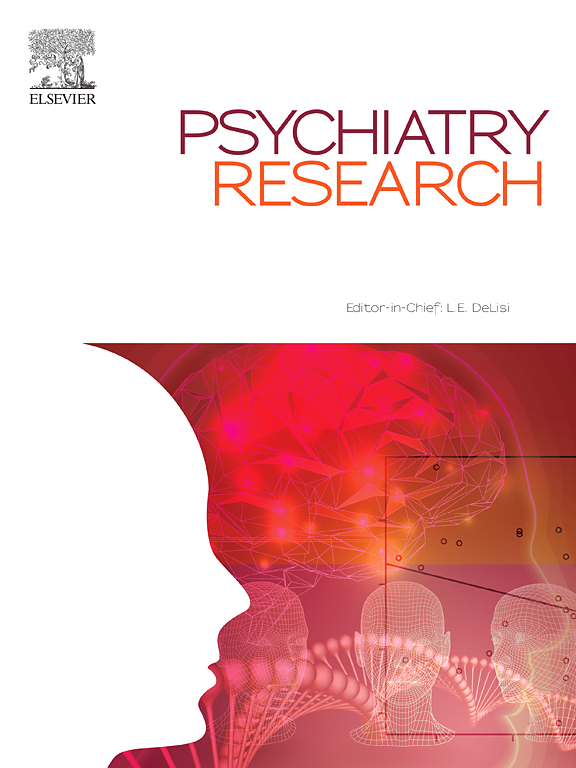Health anxiety and somatic symptoms in adults on the autism spectrum
IF 3.9
2区 医学
Q1 PSYCHIATRY
引用次数: 0
Abstract
Background
Somatic symptoms and health anxiety impact quality of life. Whether somatic symptoms and health anxiety correlate with autistic traits, anxiety/depression, sensory and personality characteristics has yet to be systematically investigated among autistic people. This study aimed to investigate somatic symptoms and health anxiety in autistic, and their clinical correlates.
Methods
This study recruited 221 autistic adults (aged 28.1±8.5), 514 somatic symptom disorder (SSD), 194 anxiety or depressive disorders (affective disorder group, AFD), and 555 non-autistic controls. All participants completed the Health Anxiety Questionnaire and Patient Health Questionnaire-15 scales to assess health anxiety and somatic symptoms.
Results
Autistic adults showed greater somatic symptoms and health anxiety than non-autistic controls. The level was similar to the AFD but lower than the SSD groups. Harm avoidance and low registration were associated with health anxiety and somatic symptoms in autism, while attention to details was positively associated with the needs of reassurance. Health-related anxiety was related to both depression and anxiety, and most domains on quality of life, with excessive health-related worries associated with greater anxiety and lower environmental life quality.
Conclusion
Findings suggest significant somatic symptoms and health anxiety in autistic adults that warrants clinical attention.
自闭症成人的健康焦虑和躯体症状
躯体症状和健康焦虑影响生活质量。躯体症状和健康焦虑是否与自闭症特征、焦虑/抑郁、感觉和人格特征相关,尚未在自闭症患者中进行系统的调查。本研究旨在探讨自闭症患者躯体症状与健康焦虑的关系及其临床意义。方法本研究招募221名成年自闭症患者(28.1±8.5岁),514名躯体症状障碍(SSD)患者,194名焦虑或抑郁患者(情感障碍组,AFD), 555名非自闭症对照组。所有参与者完成健康焦虑问卷和患者健康问卷-15量表来评估健康焦虑和躯体症状。结果自闭症成人比非自闭症对照组表现出更大的躯体症状和健康焦虑。该水平与AFD组相似,但低于SSD组。伤害回避和低登记与自闭症患者的健康焦虑和躯体症状相关,而对细节的关注与安慰需求呈正相关。与健康相关的焦虑与抑郁和焦虑以及大多数生活质量相关,过度的健康相关担忧与更大的焦虑和更低的环境生活质量相关。结论成年自闭症患者存在显著的躯体症状和健康焦虑,值得临床关注。
本文章由计算机程序翻译,如有差异,请以英文原文为准。
求助全文
约1分钟内获得全文
求助全文
来源期刊

Psychiatry Research
医学-精神病学
CiteScore
17.40
自引率
1.80%
发文量
527
审稿时长
57 days
期刊介绍:
Psychiatry Research offers swift publication of comprehensive research reports and reviews within the field of psychiatry.
The scope of the journal encompasses:
Biochemical, physiological, neuroanatomic, genetic, neurocognitive, and psychosocial determinants of psychiatric disorders.
Diagnostic assessments of psychiatric disorders.
Evaluations that pursue hypotheses about the cause or causes of psychiatric diseases.
Evaluations of pharmacologic and non-pharmacologic psychiatric treatments.
Basic neuroscience studies related to animal or neurochemical models for psychiatric disorders.
Methodological advances, such as instrumentation, clinical scales, and assays directly applicable to psychiatric research.
 求助内容:
求助内容: 应助结果提醒方式:
应助结果提醒方式:


